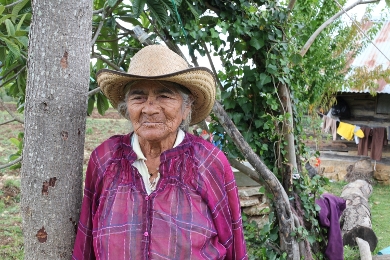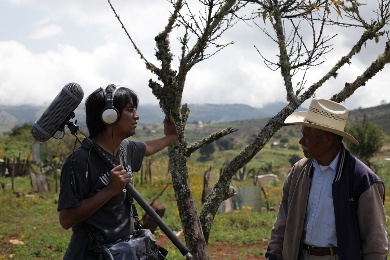Research project
Time and Identity in Indigenous Narrative and Aesthetic Strategies
This research hopes to contribute to social awareness of the consequences of colonialism for Indigenous Peoples, to the deconstruction of still existing colonial and discriminatory notions and to a better appreciation of Indigenous art and thought.
- Funding
-
 European Research Council (Advanced Grant 295434).
European Research Council (Advanced Grant 295434).
- Partners
University of Cambridge
Latin American Studies at Leiden University
Latin American studies at Edinburgh University
IMCINE (Mexican National Film Fund)
The Berlinale Film Festival
The Indigenous Film Circle
Imagine Native Film Festival in Canada
FONCA (Mexican Fund for Arts and Culture)
Centre for Arts in San Agustin Etla (Oaxaca, Mexico)
CIESAS (Mexico)
Short abstract

The research examines the narrative and aesthetic strategies employed to represent time, place and memory in relation to Indigenous identity in alternative and innovative ways. Globalization and migration make it imperative to rethink Indigeneity and Indigenous Identity in the present. Contemporary Art and Cinema produced by Indigenous Peoples offer a different reflection on identity, time, place and memory and provide an essential critique to traditional ethnography. These alternative representations of Indigenous Peoples, often focus on present-day issues, such as migration, social injustice, violence and environmental conflicts. They often recur to dramatic narrative structures, and put forward Indigenous characters as subjects and agents in the present, instead of locking them in the past. Many of the filmic and visual works examined as part of this research, link past and present, thus providing a sense of historical continuity.
Research question

What are the consequences of complex processes of cultural interaction in colonial and modern contexts for the (self-) representation of Indigenous Peoples, particularly where traditional values, symbolic universe and artistic creativity are involved? How can alternative representations be developed? What are the narrative and aesthetic strategies employed to represent time, place and memory in relation to Indigenous identity?
Research description

This research hopes to contribute to social awareness of the consequences of colonialism for Indigenous Peoples, to the deconstruction of still existing colonial and discriminatory notions and to a better appreciation of Indigenous art and thought.
At the same time it hopes to contribute to a better understanding of intercultural processes and Indigenous agency and creativity, particularly where the issue of time perception and related symbolism is concerned.
The Faculty of Archaeology at Leiden University has a long tradition of studying the tangible and intangible heritage of Indigenous Peoples in a way that connects past and present and situates cultural-historical questions in the context of present-day social issues. The ERC funded project 'Time in Intercultural Context' offers a wonderful opportunity to combine different perspectives and expertises in this matter.
This research project analyzes representations of Indigenous identities from a post-colonial perspective, in different media, such as film, (oral) literature and contemporary visual art. Ethnography, history and archaeology have often constructed Indigenous Peoples as living in the past or being on the brink of “vanishing”. This research project concentrates on alternative representations, which emphasize the present-day agency, creativity and social issues of Indigenous Peoples. It has identified a considerable corpus of films and contemporary visual art works representing indigenous identity in alternative and innovative ways, and now analyses the narrative and aesthetic aspects of these works in relation to the representation of time, place and memory.
Parallel to this, the role of time, place and memory in Mixtec narratives with regard to healing practices and nahualismo is documented through fieldwork in the Mixtec region (interviews on video with curanderas, traditional healers). The research also considers migrant indigenous narratives, which implies interviewing migrants who left from rural indigenous communities to urban centers such as Mexico City and Los Angeles, as well as the study of films and literary works representing indigenous migration from rural areas in Mexico to these urban centers.
The research combines the analysis of alternative representations with the production of alternative representations in order to gain a greater understanding of representational strategies. Concretely this research guides the production of a professional film on the contemporary uses of the Mesoamerican calendar.
This work is done together with Armando Bautista Garcia M.A. (Sistema Nacional de Creadores de Arte - Fondo Nacional para la Cultura y el Arte, Mexico), who is involved as researcher (especially on aspects of Mixtec language and culture) as well as script-writer and on-line producer.
